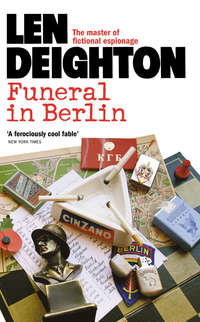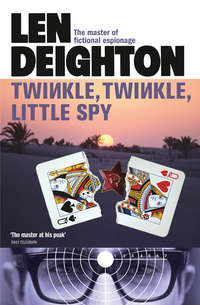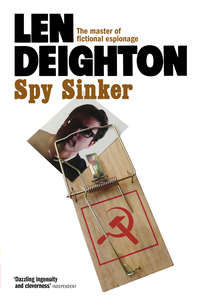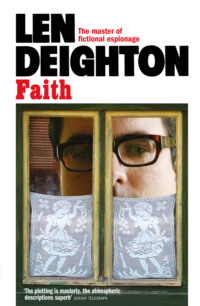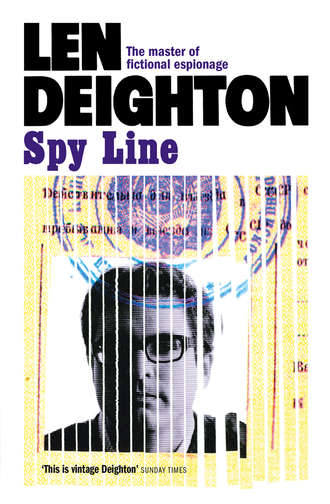
Полная версия
Spy Line
While we were drinking our cups of tea the Duchess spoke of former times in the Berlin office and she mentioned the way that Werner Volkmann had made an hotel off Ku-Damm into a ‘cosy haven for some of the old crowd’. She knew Werner was my close friend and that’s probably why she told me. Although she intended nothing but praise, I was not sure that her description augured well for its commercial success, for most of the ‘old crowd’ were noisy and demanding. They were not the sort of customers who would do much for the profit and loss account. We chatted on until, providing an example of the sort of considered guess that had helped her reputation for sorcery, she said that I’d be invited to go inside in ten minutes’ time. She was almost exactly right.
I went in quietly. Two men sat facing each other at either side of the superb mahogany dining table. Its surface was protected by a sheet of glass. Around it there were eight reproduction Hepplewhite dining chairs, six of them empty, except that one was draped with a shapeless blue jacket. A cheap cut-glass chandelier was suspended over one end of the table, revealing that the table had been moved away from the window, for even here in Charlottenburg windows could prove dangerous. One of the men was smoking. He was in shirt-sleeves and loosened tie. The window was open a couple of inches so that a draught made the curtain sway gently but didn’t disperse the blue haze of cigarette smoke. The distinctive pungent reek of coarse East German tobacco took me by the throat. Smoking was one of the few pleasures still freely available in the East and there was neither official disapproval nor social hostility towards it over there.
The man called Valeri was quite elderly for an active agent. His high cheekbones and narrow eyes gave him that almost oriental appearance that is not unusual in Eastern Europe. His complexion was like polished red jasper, flecked with darker marks and shiny like a wet pebble found on a beach. His thick brown hair – darkened and glossy with dressing – was long. He’d combed it straight back, so it covered the tops of his ears to make a shiny helmet. His eyes flickered to see me as I came through the door but his head didn’t move, and his high-pitched voice continued without faltering.
Sitting across the table from him, legs crossed in a languid posture, there was a fresh-faced young man named Larry Bower, a Cambridge graduate. His hair was fair and wavy, and he wore it long in a style that I’d heard described as Byronic, although the only picture of Byron that I could call to mind showed him with short back and sides. In contrast to the coarse ill-fitting clothes of Valeri, Bower was wearing a well-tailored fawn Saxony check suit, soft yellow cotton shirt, Wykehamist tie and yellow pullover. They were speaking German, in which Larry was fluent, as might be expected of a man with a German wife and a Rhineland beer baron grandfather named Bauer. In an armchair in the corner a grey-haired clerk bent over her notebook.
Bower raised his eyes to me as I came in. His face hardly changed but I knew him well enough to recognize a fleeting look that expressed his weariness and exasperation. I sat down in one of the soft armchairs from which I could see both men. ‘Now once again,’ said Bower, ‘this new Moscow liaison man.’ As if reflecting on their conversation he swung round in his chair to look out of the window.
‘Not new,’ said Valeri. ‘He’s been there years.’
‘Oh, how many years?’ said Bower in a bored voice, still looking out of the window.
‘I told you,’ said Valeri. ‘Four years.’
Bower leaned forward to touch the radiator as if checking to see if it was warm. ‘Four years.’
‘About four years,’ he replied defensively.
It was all part of the game: Bower’s studied apathy and his getting facts wrong to see if the interviewee changed or misremembered his story. Valeri knew that, and he did not enjoy the mistrust that such routines implied. None of us did. ‘Would you show me again?’ Bower asked, pushing a battered cardboard box across the table.
Valeri opened the box and searched through a lot of dog-eared postcard-sized photographs. He took his time in doing it and I knew he was relaxing for a moment. Even for a man like this – one of our own people as far as we knew – the prolonged ordeal of questioning could tighten the strings of the mind until they snapped.
He got to the end of the first batch of photos and started on the second pile. ‘Take your time,’ said Bower as if he didn’t know what a welcome respite it was.
Until four years before, such identity photos had been pasted into large leather-bound ledgers. But then the KGB spread alarm and confusion in our ranks by instructing three of their doubles to select the same picture, in the same position on the same page, to identify a man named Peter Underlet as a spy, a KGB colonel. In fact Underlet’s photo was one of a number that had been included only as a control. Poor Underlet. His photo should never have been used for such purposes. He was a CIA case officer, and since case officers have always been the most desirable targets for both sides, Underlet was turned inside out. Even after the KGB’s trick was confirmed, Underlet never got his senior position back: he was posted to some lousy job in Jakarta. That had all happened at the time my wife Fiona went to work for the other side. If it was a way of deflecting the CIA’s fury and contempt, it worked. I suppose that diversion suited us as much as it did the KGB. At the time I’d wondered if it was Fiona’s idea: we both knew Peter Underlet and his wife. Fiona seemed to like them.
‘This one,’ said Valeri, selecting a photo and placing it carefully on the table apart from the others. I stood up so that I could see it better.
‘So that’s him,’ said Bower, feigning interest, as if they’d not been through it all before. He picked up the photo and studied it. Then he passed it to me. ‘Handsome brute, eh? Know him by any chance?’
I looked at it. I knew the man well. He called himself Erich Stinnes. He was a senior KGB man in East Berlin. It was said that he was the liaison man between the Moscow and the East German security service. It must have been a recent photo, for he’d grown fatter since the last time I’d seen him. But he still hadn’t lost the last of his thinning hair and the hard eyes behind the small lenses of his glasses were just as fierce as ever. ‘It’s no one I’ve ever seen before,’ I said, handing the picture back to Bower. ‘Is he someone we’ve had contact with?’
‘Not as far as I know,’ said Bower. To Valeri he said, ‘Describe the deliveries again.’
‘The second Thursday of every month … The KGB courier.’
‘And you saw him open it?’ persisted Bower.
‘Only the once but everyone knows …’
‘Everyone?’
‘In his office. In fact, it’s the talk of Karlshorst.’
Bower gave a sardonic smile. ‘That the KGB liaison is sniffing his way to dreamland on the second Thursday of every month? And Moscow does nothing?’
‘Things are different now,’ said Valeri adamantly, his face unchanging.
‘Sounds like it,’ said Bower, not concealing his disbelief.
‘Take it or leave it,’ said Valeri. ‘But I saw him shake the white powder into his hand.’
‘And sniff it?’
‘I was going out of the room. I told you. I shut the door quickly, I wasn’t looking for trouble.’
‘And yet you could see it was white powder?’
‘I wish I’d never mentioned the damned stuff.’ I had him sized up now. He was a typical old-time Communist, one of the exiles who’d spent the war years in Moscow. Many such men had been trained for high posts in the Germany that Stalin conquered. What was the story behind this one? Why had he come to work for us? Blackmail? Had he committed some crime – political or secular – or was he not of the hard stuff of which leaders are made? Or was he simply one of those awkward individuals who thought for themselves?
‘No comment,’ said Bower in a tired voice and looked at his watch.
Valeri said, ‘Next week I’ll watch more carefully.’
I noticed Bower stiffen. It was a damned careless remark for an active agent to make. I was not supposed to discover that this Valeri was a double; going in and out regularly. It was the sort of slip of the tongue that kills men. Valeri was tired. I pretended not to have noticed the lapse.
Bower did the same. He should have noted it and cautioned the man but he gave an almost indiscernible shake of the head to the shorthand clerk before turning his eyes to me. Levelly he asked, ‘Is that any use?’ It was my signal to depart.
‘Not as far as I can see.’
‘Frank wanted you to know,’ he added just in case I missed the message to get out of there and let him continue his difficult job.
‘Where is he?’
‘He had to leave.’ Bower picked up the phone and said they’d break for lunch in thirty minutes. I wondered if it was a ploy. Interrogators did such things sometimes, letting the time stretch on and on to increase the tension.
I got to my feet. ‘Tell him thanks,’ I said. He nodded.
I went out to where Teacher was waiting in the ante-room. He didn’t say ‘All right’ or make any of the usual polite inquiries. Interrogations are like sacramental confessions: they take place and are seen to take place but no reference to them is ever made. ‘Are you returning me to Kreuzberg?’ I asked him.
‘If that’s where you want to be,’ said Teacher.
We said our goodbyes to the Duchess and went downstairs to be let out of the double-locked front door by the guardian.
The streets were empty. There is something soul-destroying about the German Ladenschlussgesetz – a trade-union-inspired law that closes all the shops most of the time – and right across the land, weekends in Germany are a mind-numbing experience. Tourists roam aimlessly. Residents desperate for food and drink scour the streets hoping to find a Tante Emma Laden where a shopkeeper willing to break the law will sell a loaf, a chocolate bar or a litre of milk from the back door.
As we drove through the desolate streets, I said to Teacher, ‘Are you my keeper?’
Teacher looked at me blankly.
I asked him again. ‘Are you assigned to be my keeper?’
‘I don’t know what a keeper is.’
‘They have them in zoos. They look after the animals.’
‘Is that what you need, a keeper?’
‘Is this Frank’s idea?’
‘Frank?’
‘Don’t bullshit me, Teacher. I was taking this town to pieces when you were in knee pants.’
‘Frank knows nothing about you coming here,’ he said mechanically. It contradicted everything he’d previously said but he wanted to end the conversation by making me realize that he was just obeying instructions: Frank’s instructions.
‘And Frank keeps out of the way so that he can truthfully tell London that he’s not seen me.’
Teacher peered about him and seemed unsure of which way to go. He slowed to read the street signs. I left him to figure it out. Eventually he said, ‘And that annoys you?’
‘Why shouldn’t it?’
‘Because if Frank had any sense he’d toss you on to the London plane, and let you and London work it all out together,’ said Teacher.
‘That’s what you’d do?’
‘Damned right I would,’ said Teacher.
We drove along Heer Strasse, which on a weekday would have been filled with traffic. Every now and again there had been a dusty glint in the air as a flurry offered a sample of the promised snow. Now it began in earnest. Large spiky flakes came spinning down. Time and time again the last snow had come, and still the cold persisted, reminding those from other climates that Berlin was on the edge of Asia.
In what was either carelessness or an attempt to impress me with his knowledge of Berlin, Teacher turned off and tried to find a shortcut round the Exhibition Grounds. Twice he came to a dead end. Finally I took pity on him and directed him to Halensee. Then, as we got to Kurfürstendamm, he sat back in his seat, sighed and said, ‘I suppose I am your keeper.’
‘And?’
‘Frank might like to hear your reactions.’
‘Berlin is the heroin capital of the world,’ I said.
‘I read that in Die Welt,’ said Teacher.
I ignored the sarcasm. ‘It all comes through Schönefeld airport. Those bastards make sure it keeps moving to this side of the Wall.’
‘If it all comes here, then it makes sense that someone might try sending a little of it back,’ said Teacher.
‘Stinnes is top brass nowadays. He’d have a lot to lose. I can’t swallow the idea that he’s having an army courier pick up consignments of heroin – or whatever it is – in the West.’
‘But?’
‘Yes, there is a but. Stinnes knows the score. He’s spent a lot of time in the West. He’s an active womanizer and some types of hard drugs connect with sexual activity.’
‘Connect? Connect how?’
‘A lot of people use drugs only when they jump into bed. I could perhaps see Stinnes in that category.’
‘So I tell Frank you think it’s possible.’
‘Only possible; not likely.’
‘A nuance,’ said Teacher.
‘Once upon a time this fellow Stinnes was stringing me along … He told me he wanted to come across to us.’
‘KGB? Enrolled?’
‘That’s what he said.’
‘And you swallowed it?’
‘I urged caution.’
‘That’s the best way: cover all the exits,’ said Teacher. He was not one of my most fervent admirers. I suspected that Frank had painted me too golden.
‘Anyway: once bitten twice shy.’
‘I’ll tell Frank exactly what you said,’ he promised.
‘This is not the way to Kreuzberg.’
‘Don’t get alarmed. I thought I’d give you lunch before you go back to that slum.’ I wondered if that too was Frank’s idea. Mr Teacher didn’t look like a man much given to impulsive gestures.
‘Thanks.’
‘I live in Wilmersdorf. My wife always has too much food in the house. Will that be okay?’
‘Thanks,’ I said.
‘I’ve given my expenses a beating this month. I had a wedding anniversary.’
By the time we arrived in Wilmersdorf the streets were wrapped in a fragile tissue of snow. Teacher lived in a smart new apartment block. He parked in the underground car park that served the building. It was well lit and heated: luxury compared with Kreuzberg. We took the elevator to his apartment on the fourth floor.
He rang the bell while opening the door with his key. Once inside he called to his wife. ‘Clemmie? Clem, are you there?’
Her voice replied from somewhere upstairs, ‘Where the hell have you been? Do you know what time it is?’
‘Clemmie –’
She still didn’t appear. ‘I’ve eaten my lunch. You’ll have to make do with an egg or something.’
Standing awkwardly in the hall he looked at the empty landing and then at me and smiled ruefully. ‘Egg okay? Clemmie will make omelettes.’
‘Wonderful.’
‘I’ve brought a colleague home,’ he called loudly.
His wife came down the stairs, skittish and smiling. She was worth waiting for; young, long-legged and shapely. She touched her carefully arranged hair and flashed her eyes at me. She looked as if her make-up was newly applied. Her smile froze as she noticed some flecks of snow on his coat. ‘My God! When does summer come to this damned town?’ she said, holding him personally responsible.
‘Clemmie,’ said Teacher after she’d offered her cheek to be kissed, ‘this is Bernard Samson, from the office.’
‘The famous Bernard Samson?’ she asked with a throaty chuckle. Her voice was lower now and her genial mockery was not unattractive.
‘I suppose so,’ I said. So much for Teacher’s ingenuous inquiry about whether I was married. Even his wife knew all about me.
‘Take off your coat, Bernard,’ she said in a jokey flirtatious way that seemed to come naturally to her. Perhaps the dour Teacher was attracted to her on that account. She took my old coat, draped it on a wooden hanger marked Disneyland Hotel Anaheim, California and hung it in an antique walnut closet.
She was wearing a lot of perfume and a button-through dress of light green wool, large earrings and a gold necklace. It was not the sort of outfit you’d put on to go to church. She must have been six or eight years younger than her husband and I wondered if she was trying to acquire the pushy determination that young wives need to survive the social demands of a Berlin posting.
‘Bernard Samson: secret agent! I’ve never met a real secret agent before.’
‘That was long ago,’ said Teacher in an attempt to warn her off.
‘Not so long ago,’ she said archly. ‘He’s so young. What is it like to be a secret agent, Bernard? You don’t mind if I call you Bernard, do you?’
‘Of course not,’ I said awkwardly.
‘And you call me Clemmie.’ She took my arm in a gesture of mock confidentiality. ‘Tell me what it’s like. Please.’
‘It’s like being a down-at-heel Private Eye,’ I said. ‘In a land where being a Private Eye will get you thirty years in the slammer. Or worse.’
‘Find something for us to eat, Clemmie,’ said Teacher in a way that suggested that his acute embarrassment was turning to anger. ‘We’re starved.’
‘Darling, it’s Sunday. Let’s celebrate. Let’s open that lovely tin of sevruga that you got from someone I’m not allowed to inquire about,’ she said.
‘Wonderful idea,’ said Teacher and sounded relieved at this suggestion. But he still did not look happy. I suppose he never did.
Clemmie went into the kitchen to find the caviar while Teacher took me into the sitting room and asked me what I wanted to drink.
‘Do you have vodka?’ I asked.
‘Stolichnaya, or Zubrovka or a German one?’ He set up some glasses.
‘Zubrovka.’
‘I’ll get it from the fridge. Make yourself at home.’
Left alone I looked around. It is not what guests are expected to do but I can never resist. It was a small but comfortable apartment with a huge sofa, a big hi-fi and a long shelf of compact discs – mostly outmoded pop groups – that I guessed were Clemmie’s. On the coffee table there was a photo album, the sort of leather-bound tasselled one in which people record an elaborate wedding. It bulged with extra pictures and programmes. I opened it. Every page contained photos of Clemmie: on the athletic field, running the 1,000 metres, hurdling, getting medals, waving silver cups. The pages were lovingly captioned in copperplate writing. Tucked into the back she was to be seen in already yellowing sports pages torn from the sort of local newspaper that carries large adverts for beauty salons and nursing homes. In all the pictures she looked so young: so very very young. She must have been here looking through it when she heard us at the door, and then rushed upstairs to put on fresh make-up. Poor Clemmie.
The apartment block was new and the walls were thin. As Teacher went into the kitchen I heard his wife speak loudly, ‘Jesus Christ, Jeremy! Why did you bring him here?’
‘I didn’t have cash or I would have taken us all to a restaurant.’
‘Restaurant …? If the office hear all this, you’ll be in a row.’
‘Frank said give him lunch. Frank likes him.’
‘Frank likes everyone until the crunch comes.’
‘I’m assigned to him.’
‘You should never have agreed to do it.’
‘There was no one else.’
‘You told me he was a pariah, and that’s what you’ll end up as if you don’t keep the swine at arm’s length.’
‘I wish you’d let me do things my way.’
‘It was letting you do things your way that brought us to this bloody town.’
‘We’ll have a nice long leave in six months.’
‘Another six months here with these bloody krauts and I’ll go round the bend,’ she said.
There was the sound of a refrigerator door closing loudly, and of ice-cubes going into a jug.
‘You don’t have to put up with them,’ she said. Her voice was shrill now. ‘Pushing and elbowing their way in front of you at the check-outs. I hate the bloody Germans. And I hate this terrible winter weather that goes on and on and on. I can’t stand it here!’
‘I know, darling.’ His voice remained soft and affectionate. ‘But please try.’
When he returned he poured two large measures of vodka and we drank them in silence. I suppose he knew how thin the walls were.
It was not an easy lunch. We consumed 250 grams of Russian sevruga virtually in silence. With it we had rye bread and vodka. ‘The spring catch,’ said Teacher knowledgeably as he tasted the caviar. ‘That’s always the best.’
Unsure of an appropriate response to that sort of remark I just said it was delicious.
Clemmie’s mascara was smudged. She responded minimally to her husband’s small-talk. She wouldn’t have a drink: she kept to water. I felt sorry for both of them. I wanted to tell them it didn’t matter. I wanted to tell her it was just the Berlin Blues, the claustrophobic time that all the wives suffered when they were first posted to ‘the island’. But I was too cowardly. I just contributed to the small-talk and pretended not to notice that they were having a private and personal row in silence.
3
‘Keep going!’ I told Teacher as he began to slow down to let me out of the car.
‘What?’
‘Keep-going keep-going keep-going!’
‘What’s the matter with you?’ he said, but he kept going and passed the car that had attracted my notice. It was parked right outside my front door.
‘Turn right and go right round the block.’
‘What did you see? A car you recognize?’
I made a prevaricating noise.
‘What then?’ he persisted.
‘A car I didn’t recognize.’
‘Which one?’
‘The black Audi … Too smart for this street.’
‘You’re getting jumpy, Samson. There’s nothing wrong, I’ll bet you …’
As he was speaking a police car cruised slowly past us, but Teacher gave no sign of noticing it. I suppose he had other things on his mind. ‘Perhaps you’re right,’ I said. ‘I am a bit jumpy. I remember now it belongs to my landlady’s brother.’
‘There you are,’ said Teacher. ‘I told you there was nothing wrong.’
‘I need a good night’s sleep. Let me off on the corner. I must buy some cigarettes.’
He stopped the car outside the shop. ‘Closed,’ he said.
‘They have a machine in the hallway.’
‘Righto.’
I opened the car door. ‘Thanks for sharing your caviar. And tell Clemmie thanks too. Sorry if I outstayed my welcome.’ He’d let me have a hot shower. I felt better but couldn’t help wondering if the grime was going to block the drain. I was grateful. ‘And best wishes to Frank,’ I added as an afterthought.
He nodded. ‘I was on the phone to him. Frank says you’re to keep away from Rudi Kleindorf.’
‘Forget about the good wishes.’
He gave a grim little smile and revved the motor and pulled away as soon as I closed the door. He was worried about his wife. I took a deep breath. The air was thick with the stink from the lignite-burning power stations that the DDR have on all sides of the city. It killed the trees, burned the back of the throat and filled the nostrils with soot. It was the Berlinerluft.
I let Teacher’s car go out of sight before cautiously returning down the street to rap on the window of the red VW Golf. Werner reached over to unlock the door and I got into the back seat.
‘Thank God. You’re all right, Bernie?’
‘Why wouldn’t I be?’
‘Where have you been?’ Werner was good at hiding his feelings but there was no doubt about his agitated state.
‘What does it matter?’ I said. ‘What’s going on?’
‘Spengler is dead. Someone murdered him.’
Bile rose in my throat. I was too old for rough stuff: too old, too involved, too married, too soft. ‘Murdered him? When?’
‘I was going to ask you,’ said Werner.
‘What’s that mean, Werner? Do you think I’d murder the poor little sod?’ Werner’s manner annoyed me. I’d liked Spengler.
‘I saw Johnny. He was looking for you, to warn you that the cops were here.’


